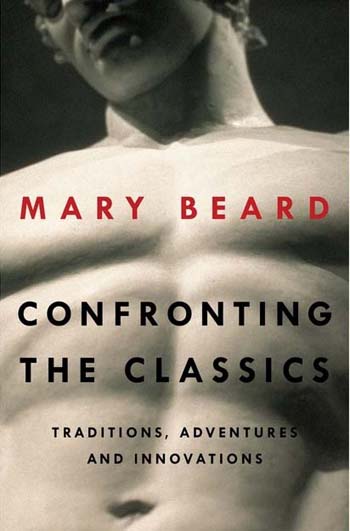In the weeks leading up to the March 13 announcement of the 2013 NBCC award winners, Critical Mass highlights the thirty finalists. Today, NBCC board member Eric Banks offers an appreciation of Mary Beard's criticism finalist, Confronting the Classics: Traditions, Adventures and Innovations (Liveright).

Nothing warms the heart of a beleaguered reviews editor more than the specialist academic who is both willing to convey the excitement of his or her area of expertise and agile at sharing his or her knowledge. It’s a rare combination: scholars able to write well for a general readership are few. In the field of the classics, however, readers of publications such as the New York Review of Books, the London Review of Books, and the Times Literary Supplement have for some time enjoyed the prose and taste of Mary Beard, a professor at Cambridge as well as a familiar public presence in the UK, where she also wears the hat of frequent television presenter and TLS blogger. In the collection Confronting the Classics: Traditions, Adventures, and Innovations, Beard has gathered more than thirty short essays written for these and other publications that crackle with intelligence and wit. Taken as a whole, they offer a fascinating advertisement for the joy of the classics.
Beard’s interests as evidenced here are broad—she reviews classics in translation, the work of archaeologists and historians, biographies, contemporary travel literature, virtually anything, in other words, that touches on the world she studies. But what makes her work so exceptional—and Confronting the Classics an instant classic of the critical literature—is her ability to translate what might be an “academic” dispute into an occasion for rethinking our relationship to the canon, to the legacy of classical studies, and to a body of scholarship we may think increasingly quaint. Look for example at her incredible essay on how little we understand the language of Thucydides, how quickly we are to paraphrase, and how much that imparts concerning our own understanding of war and political power. “I think the author himself”—Donald Kagan, that is, not Thucydides—“was a bit surprised to see his technical commentary … discussed in the pages of the New York Review of Books,” she confesses in Confronting the Classics’s afterward. But her critical engagement in the book is an argument by example for why such things matter.
Beard isn’t afraid to be harsh. She is dismissive of Stacy Schiff’s Cleopatra and somewhat impatient with Patrick Leigh Fermer. In both cases—and throughout her body of criticism—she is fully respectful of her reader’s intelligence, even if he or she isn’t expected to be up on the latest in Sappho scholarship or to carry around a mental catalogue raisonné of the works of Fuseli (or for that matter, to read Greek or Latin). And that’s precisely what makes her work sparkle on the page. She reminds us that the announcement that the code of Linear B had been cracked occurred on BBC Radio, not in the pages of a specialized journal. On the eternal question of the decline of the humanities—and the future of classics in particular—she writes, “The important cultural point is that some people should have read Virgil and Dante. To put it another way, the overall strength of Classics is not to be measure by exactly how many young people know Latin and Greek from school or university. It is better measured by asking how many believe that there should people in the world who do know Latin and Greek, how many people think that there is an expertise in that worth taking seriously—and ultimately paying for.” Anybody wanting to skew the results of that second query could easily do so by exposing the respondent to Beard’s remarkable, enticing collection.

